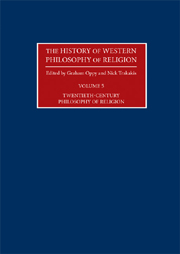Book contents
- Frontmatter
- Contents
- Editorial Introduction
- Contributors
- 1 Twentieth-Century Philosophy of Religion: An Introduction
- 2 William James
- 3 Henri Bergson
- 4 John Dewey
- 5 Alfred North Whitehead and Charles Hartshorne
- 6 Bertrand Russell
- 7 Max Scheler
- 8 Martin Buber
- 9 Jacques Maritain
- 10 Karl Jaspers
- 11 Paul Tillich
- 12 Karl Barth
- 13 Ludwig Wittgenstein
- 14 Martin Heidegger
- 15 Emmanuel Levinas
- 16 Simone Weil
- 17 A. J. Ayer
- 18 William P. Alston
- 19 John Hick
- 20 Mary Daly
- 21 Jacques Derrida
- 22 Alvin Plantinga
- 23 Richard Swinburne
- 24 Late-Twentieth-Century Atheism
- Chronology
- Bibliography
- Index
22 - Alvin Plantinga
- Frontmatter
- Contents
- Editorial Introduction
- Contributors
- 1 Twentieth-Century Philosophy of Religion: An Introduction
- 2 William James
- 3 Henri Bergson
- 4 John Dewey
- 5 Alfred North Whitehead and Charles Hartshorne
- 6 Bertrand Russell
- 7 Max Scheler
- 8 Martin Buber
- 9 Jacques Maritain
- 10 Karl Jaspers
- 11 Paul Tillich
- 12 Karl Barth
- 13 Ludwig Wittgenstein
- 14 Martin Heidegger
- 15 Emmanuel Levinas
- 16 Simone Weil
- 17 A. J. Ayer
- 18 William P. Alston
- 19 John Hick
- 20 Mary Daly
- 21 Jacques Derrida
- 22 Alvin Plantinga
- 23 Richard Swinburne
- 24 Late-Twentieth-Century Atheism
- Chronology
- Bibliography
- Index
Summary
In the halcyon days of post-positivisitic analytic philosophy, philosophy of religion and philosophical theology were considered by many to have been relegated to the forgotten realms of outmoded superstition they so richly deserved. Antony Flew's (1961, 1984) sophisticated recasting of David Hume's concerns over miracles and natural theology, John Mackie's (1955) stunning attack on the free will defence, R. M. Hare's (1955) sensible non-cognitive analysis of religious language, and many other enticing rebuttals of classical theism dominated the landscape and bode ill for any future progress in the philosophical defence of traditional belief.
Anyone aware of the state of analytic philosophy of religion at the start of the twenty-first century knows that the current picture could not be more radically different from that just described. Research programmes abound, and many of the philosophers conducting them profess and defend a profound belief in Western theism in general and Christianity in particular. There are many reasons for this amazing turnaround and many philosophers who share the credit, among them William Alston, Richard Swinburne and Nicholas Wolterstorff. But there can be no doubt that one of the premier champions of this team is the American philosopher Alvin Plantinga.
Alvin Carl Plantinga was born on 15 November 1932, in Ann Arbor, Michigan. He received philosophy degrees from Calvin College (AB in 1954), the University of Michigan (MA in 1955), and Yale University (PhD in 1958).
- Type
- Chapter
- Information
- The History of Western Philosophy of Religion , pp. 271 - 284Publisher: Acumen PublishingPrint publication year: 2009

